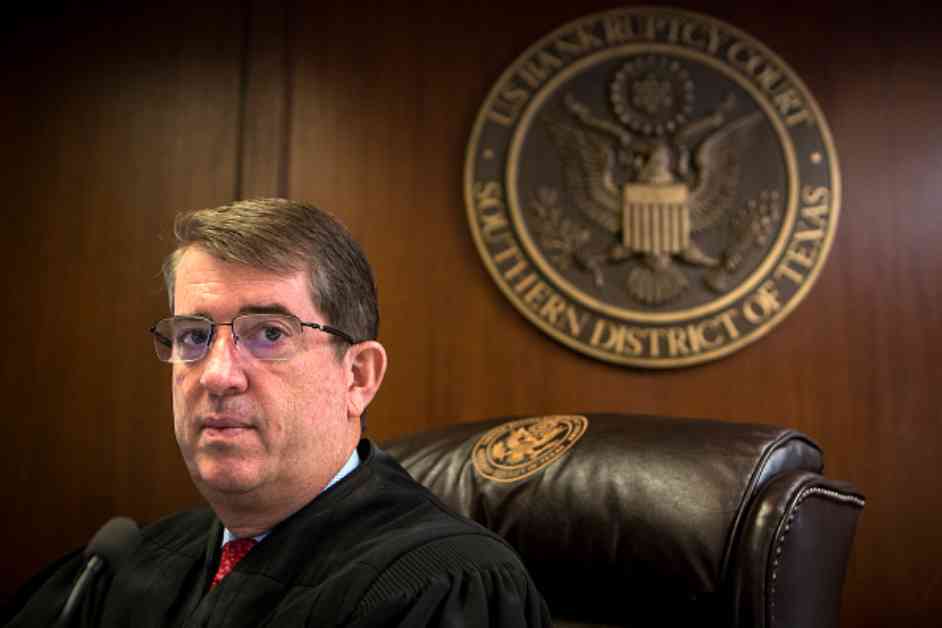Former Bankruptcy Judge Sanctioned for Ethics Violation in Romance Case
In a recent development, former U.S. Bankruptcy Judge David R. Jones of Houston has been sanctioned for attempting to avoid a deposition by engaging in an unauthorized off-the-record interview with the law firm that employed his romantic partner. This incident has raised serious concerns about ethical standards within the judicial system and has prompted Chief U.S. Bankruptcy Judge Eduardo V. Rodriguez of the Southern District of Texas to order Jones to undergo 7.5 hours of ethics training. The judge described Jones’ actions as a “flagrant contravention of his obligations” under the U.S. judicial code, signaling a significant breach of trust and integrity within the legal community.
Background of the Case
Jones came under scrutiny in October 2023 following allegations of an undisclosed romantic relationship with Elizabeth Freeman, a former partner at the Houston bankruptcy firm Jackson Walker. This relationship raised concerns about potential conflicts of interest, as lawyers from Jackson Walker frequently appeared before Jones in bankruptcy cases. The situation escalated when the U.S. bankruptcy trustee sought to claw back compensation to Jackson Walker in 33 cases, leading to a series of legal proceedings that ultimately culminated in Jones’ resignation.
Ethics Violation and Sanctions
Rodriguez’s ruling in the case highlighted the severity of Jones’ actions, citing judiciary regulations that prohibit federal judicial personnel from providing testimony about official acts without authorization. Despite Jones’ attempts to justify his actions by claiming that the regulations only applied to sworn testimony, Rodriguez firmly rejected this argument, emphasizing that Jones had knowingly violated his obligations in an effort to evade providing sworn testimony in the proceeding. This blatant disregard for ethical standards prompted Rodriguez to sanction Jones and order him to undergo ethics training as a corrective measure.
In his ruling, Rodriguez acknowledged that while Jackson Walker and the other lawyers involved in the case were not subject to the same regulations as Jones, their participation in the unauthorized off-the-record interview was highly questionable. Although they were not formally sanctioned, Rodriguez criticized their actions and cautioned against engaging in similar conduct in the future. The judge emphasized the need for all parties involved to adhere to the highest ethical standards and to exercise caution when navigating sensitive legal matters.
Lessons Learned and Moving Forward
The case involving Judge David R. Jones serves as a sobering reminder of the importance of upholding ethical standards in the legal profession. It underscores the need for transparency, integrity, and accountability among judicial officials and legal practitioners to maintain public trust and confidence in the justice system. The sanctions imposed on Jones should serve as a deterrent to others who may be tempted to compromise their ethical responsibilities for personal gain or convenience.
As the legal community reflects on this case and its implications, it is essential to reiterate the fundamental principles of judicial ethics and professional conduct. Judges, lawyers, and court personnel must uphold the highest standards of integrity and impartiality in their professional endeavors to ensure the fair and just administration of justice. By learning from the mistakes of the past and committing to ethical excellence, the legal profession can uphold its reputation and fulfill its duty to serve the interests of justice and the public good.
Conclusion
The case of former Bankruptcy Judge David R. Jones highlights the importance of ethical conduct and accountability in the legal profession. Jones’ sanctions for attempting to avoid a deposition through unauthorized means underscore the serious consequences of ethical violations within the judiciary. As legal professionals and judicial officials strive to uphold the principles of integrity and transparency, it is crucial to remain vigilant and diligent in adhering to ethical standards. By promoting ethical excellence and accountability, the legal community can uphold its commitment to justice and the rule of law.















